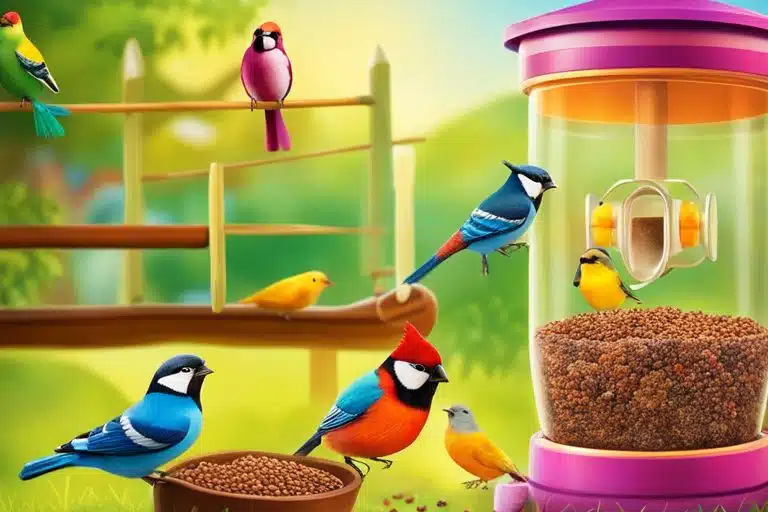This comprehensive guide covers everything you need to know about feeding backyard birds, including the best types of bird seed and feeders to attract a wide variety of bird species to your yard. Sunflower seeds are a favorite among many birds, with black oil sunflower seeds being a top choice for attracting cardinals, chickadees, and sparrows. Peanuts are high in protein and fat, ideal for woodpeckers and nuthatches, while suet treats provide imperative calories for small birds in winter. Seed mixes, such as thistle, millet, and safflower, cater to a diverse range of birds, from finches to jays. Always opt for fresh seed and clean feeders regularly to prevent the spread of diseases like salmonella. By following these tips, you can create a bird-friendly backyard paradise that will attract a multitude of feathered friends.

Explore the Types of Bird Food
While feeding the birds in your backyard, it is important to consider the types of bird food that will attract a variety of bird species. Different birds have preferences for specific types of seeds and feed. Understanding the best types of bird seed and feeders can help you attract a wide range of birds to your yard. Perceiving the feeding habits of certain birds will guide you in selecting the right bird food for your backyard feeders.
| Sunflower Hearts and Seeds | Peanuts |
| Sunflower seeds are loved by many birds like finches, robins, blackbirds, and tits. Use them in various feeders to attract a wide variety of birds. | Peanuts are high in protein and fat, attracting woodpeckers, nuthatches, and tit species to hanging feeders. Avoid salted peanuts and opt for aflatoxin-free peanuts to prevent harm to birds. |
| Nyjer Seeds | Fat Balls and Suet Treats |
| Nyjer seeds are popular among goldfinches and other finches. Use them in specialized feeders or on bird tables to attract these birds. | Fat balls and suet treats are ideal for winter feeding, providing high-calorie content for small birds to survive cold nights. Ensure birds have access to these calorie-rich treats during colder months. |
Sunflower Hearts and Seeds
Now, sunflower seeds are a favorite among a variety of birds due to their high protein and fat content. They can be used in hanging feeders, bird tables, and ground feeders to attract species like finches, robins, and tits to your backyard.
Peanuts
Little peanuts are a popular choice for attracting woodpeckers, nuthatches, and tit species to your feeder. Opt for aflatoxin-free peanuts to ensure the safety of the birds visiting your backyard.
Nyjer Seeds
You can use Nyjer seeds to attract goldfinches and other finches to your feeders. These small, black seeds are rich in oils and provide a nutritious food source for the birds in your yard.
Fat Balls and Suet Treats
Treats like fat balls and suet provide imperative calories for small birds to survive harsh winter weather. Make sure to offer these calorie-rich treats to birds during colder months to help them maintain their energy levels.

Choosing the Right Variety Feeders
Factors to Consider in Feeder Selection
Despite the wide variety of bird feeders available, it’s important to consider a few key factors when choosing the right one for your backyard. Factors such as feeder type, bird species, location, easy access for refilling, and protection from predators should all be taken into account. Assume that different birds have different feeding preferences and behaviors, so having a variety of feeders can attract a wider range of bird species.
Pros and Cons of Different Feeder Types
| Feeder Type | Pros and Cons |
| Tube Feeders | Good option for attracting small birds, but can be difficult to clean |
| Platform Feeders | Attracts ground-feeding birds, but may also attract squirrels |
| Suet Feeders | Preferred by woodpeckers and chickadees, but can melt in hot weather |
| Hopper Feeders | Easy to fill and can hold a variety of seed types, but can be prone to squirrel visits |
| Mesh Feeders | Great for offering peanuts, but can get clogged with debris |
Pros: Choosing the right feeder type can make all the difference in attracting a variety of bird species to your backyard. By offering different feeder types, you can cater to the specific preferences of certain birds while keeping others away. It’s vital to provide a feeder that meets the needs of the widest variety of birds in your area.
Step-by-Step Guide to Setting up Your Feeder
| Step | Instruction |
| 1 | Choose the right location for your feeder, away from potential predators |
| 2 | Fill your feeder with fresh seed regularly to attract a variety of birds |
| 3 | Keep the area around the feeder clean to prevent the spread of diseases |
| 4 | Monitor the feeder for any issues such as squirrel visits or seed mold |
| 5 | Adjust the feeder height or add baffles to deter unwanted visitors |
There’s a right bird feeder for every backyard, and by following these steps, you can attract a wider variety of birds while keeping them safe and healthy. Providing the right feeder setup can make a significant impact on the number and diversity of bird species that visit your yard.

Tips for Attracting Various Bird Species
Unlike other animals, birds have specific dietary preferences based on their species, making it important to tailor your offerings to desired bird species. For example, woodpeckers are attracted to suet feeders, while sparrows enjoy millet. To attract a wide variety of birds, consider offering a mix of sunflower seeds, suets, safflower seeds, and cracked corn in your bird feeders. Perceiving the feeding habits of different bird species will help you tailor your offerings to attract the greatest variety of birds to your backyard. For more information on feeding birds in your backyard, visit Feeding birds in your backyard.
Tailoring Your Offerings to Desired Birds
There’s a wide variety of bird species that visit backyard feeders, each with their own preferences. To attract specific birds, offer a variety of seed types like black oil sunflower seeds, millet, and cracked corn. Make sure to provide different feeder types as well, such as platform feeders for birds that prefer to feed on the ground and tube feeders for smaller birds like chickadees and finches.
Adjusting Feed and Feeders with Seasons
Seasons play a crucial role in bird feeding habits. Various bird species may have different preferences depending on the season, so it’s important to adjust your offerings accordingly. In colder months, birds may require higher-fat foods like suet to help them stay warm. In spring and summer, birds may prefer fresh seed that attracts a wider variety of species. Changing your feed and feeders with the seasons can help attract the greatest variety of birds to your yard.
Maintaining a Healthy Bird Feeding Environment
Regular Cleaning and Maintenance of Feeders
If you want to provide a safe and healthy feeding environment for your backyard birds, regular cleaning and maintenance of your bird feeders is crucial. By regularly cleaning your bird feeders, you can prevent the spread of diseases among the birds that visit your yard, such as salmonella and trichomonosis.
Preventing Disease Spread among Backyard Birds
If you want to prevent the spread of diseases among your backyard birds, it is crucial to keep your bird feeders clean and free from moldy food. Regular cleaning of feeders, along with using fresh bird food, can help minimize the risk of potential bird diseases spreading.
Tips for Deterring Pests and Predators
With the right strategies in place, you can effectively deter pests and predators from disrupting your backyard bird feeding setup. Recognizing the potential threats, such as squirrels and rats, can help you take proactive steps to protect your bird feeders and the birds that visit your yard.
- Use squirrel-proof feeders to prevent squirrels from stealing bird seed.
- Keep your bird feeding area clean to avoid attracting pests.
- Position feeders away from trees or structures where predators may hide.
Final Words
Considering all points mentioned in this detailed guide, it is clear that choosing the right bird feeder and bird seed is crucial to attracting a wide variety of birds to your backyard. From sunflower seeds to suet, millet to safflower, there are specific types of seeds that cater to certain bird species. By offering a variety of feeders and high-quality bird seed, you can ensure that you attract the greatest variety of birds to your yard. Remember to change the seed frequently, avoid using fillers that may not be preferred by birds, and never buy birdseed that may be harboring aflatoxins. With the right bird feeder and bird seed choices, you can create a bird-friendly environment that will bring joy to both you and the feathered visitors in your garden.
FAQ
Q: What are the best types of bird seed for attracting a variety of backyard birds?
A: When looking to attract a wide range of bird species to your backyard, consider using a mix of black oil sunflower seeds, millet, cracked corn, and safflower seeds. These seeds are favorites among many bird species, including cardinals, chickadees, finches, and jays, providing a diverse and nutritious option to feed the birds in your yard.
Q: How can I choose the right bird feeder to attract specific types of birds?
A: Different bird feeders cater to specific bird species. Tube feeders are ideal for attracting smaller birds like finches and chickadees, while platform feeders are preferred by ground-feeding birds such as doves and sparrows. Suet feeders are perfect for woodpeckers and nuthatches. Understanding the preferences of the birds you want to attract will help you choose the best feeder for your backyard.
Q: What types of bird seed mixes should I use to provide a balanced diet for a variety of backyard birds?
A: A quality bird seed mix should include a combination of black oil sunflower seeds, white millet, and striped sunflower seeds. These seeds appeal to a wide range of bird species, from sparrows to goldfinches. Additionally, consider adding some cracked corn and peanuts to attract birds like jays and cardinals. Providing a diverse seed mix ensures that you can feed many different types of birds in your yard.
As a bird enthusiast with a passion for sharing the wonders of our feathered friends. As a writer and nature lover, I'm thrilled to connect with fellow bird buffs and inspire others to take flight into the fascinating world of birds. Let's wing it together!


